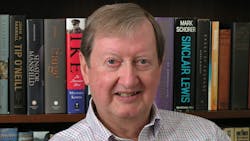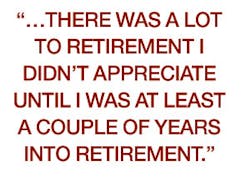Retirement.
The prospect of life after the office is rewarding, really scary, or something many managers in manufacturing would rather not think about.
Or maybe it’s a complex combination of all three.
I probably don’t know you, and I will not presume to tell you what to do in your retirement. Your retirement is yours to plan, and it’s for you to make choices, aided by whatever professional or friendly advice you choose to accept.
Nevertheless, based on my experience, may I strongly suggest you do not try to plan prospectively each and every aspect of your retirement?
If you are as I was, you have not retired before. Despite some years of thought and years of serious financial planning, there was a lot to retirement I didn’t appreciate until I was at least a couple of years into retirement. For instance, finishing an advanced degree did not have the same appeal or urgency I had once felt. And having traveled much of the Americas, Europe, and Asia multiple times in my nearly 40-year career, catching a flight across oceans or boarding a ship to faraway places was not a priority.
Early in retirement, however, I began going through bits of writing I had tossed into folders for a couple of decades. Some of the phrases and paragraphs, and even a short story, seemed worth more than just a look. There were a couple of academic papers on nineteenth-century American history that seemed to have promise for publication. At the same time, my passion for photography was being rekindled, and I again started taking large numbers of photographs, mostly of nature, and produced among others, black-and-white prints of America’s desert southwest. Opening those folders shortly after I retired and opening a camera lens again many hundreds of times were not expected, certainly not planned for. Nor have been three published books of poems and several books of photographs. Yet, for me, welcoming the unexpected, the unplanned, in my retirement has proven to be as vital as the financial planning that I needed to do before retirement.
This is another of a series of occasional essays by John S. McClenahen, who retired from IndustryWeek in 2006. An award-winning writer and photographer, his books include An Unexpected Poet, published in March 2013.
About the Author
John McClenahen
Former Senior Editor, IndustryWeek
John S. McClenahen, is an occasional essayist on the Web site of IndustryWeek, the executive management publication from which he retired in 2006. He began his journalism career as a broadcast journalist at Westinghouse Broadcasting’s KYW in Cleveland, Ohio. In May 1967, he joined Penton Media Inc. in Cleveland and in September 1967 was transferred to Washington, DC, the base from which for nearly 40 years he wrote primarily about national and international economics and politics, and corporate social responsibility.
McClenahen, a native of Ohio now residing in Maryland, is an award-winning writer and photographer. He is the author of three books of poetry, most recently An Unexpected Poet (2013), and several books of photographs, including Black, White, and Shades of Grey (2014). He also is the author of a children’s book, Henry at His Beach (2014).
His photograph “Provincetown: Fog Rising 2004” was selected for the Smithsonian Institution’s 2011 juried exhibition Artists at Work and displayed in the S. Dillon Ripley Center at the Smithsonian Institution in Washington, D.C., from June until October 2011. Five of his photographs are in the collection of St. Lawrence University and displayed on campus in Canton, New York.
John McClenahen’s essay “Incorporating America: Whitman in Context” was designated one of the five best works published in The Journal of Graduate Liberal Studies during the twelve-year editorship of R. Barry Leavis of Rollins College. John McClenahen’s several journalism prizes include the coveted Jesse H. Neal Award. He also is the author of the commemorative poem “Upon 50 Years,” celebrating the fiftieth anniversary of the founding of Wolfson College Cambridge, and appearing in “The Wolfson Review.”
John McClenahen received a B.A. (English with a minor in government) from St. Lawrence University, an M.A., (English) from Western Reserve University, and a Master of Arts in Liberal Studies from Georgetown University, where he also pursued doctoral studies. At St. Lawrence University, he was elected to academic honor societies in English and government and to Omicron Delta Kappa, the University’s highest undergraduate honor. John McClenahen was a participant in the 32nd Annual Wharton Seminars for Journalists at the Wharton School at the University of Pennsylvania in Philadelphia. During the Easter Term of the 1986 academic year, John McClenahen was the first American to hold a prestigious Press Fellowship at Wolfson College, Cambridge, in the United Kingdom.
John McClenahen has served on the Editorial Board of Confluence: The Journal of Graduate Liberal Studies and was co-founder and first editor of Liberal Studies at Georgetown. He has been a volunteer researcher on the William Steinway Diary Project at the Smithsonian Institution, Washington, D.C., and has been an assistant professorial lecturer at The George Washington University in Washington, D.C.

